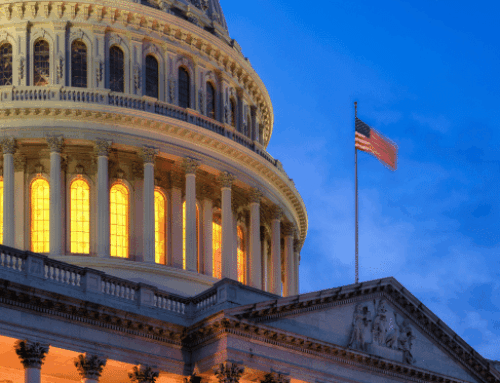Happy 4th of July, BWAF faithful! Do you know the old saying, “More bang for your buck”?
Well, this year, when it comes to fireworks on America’s birthday – the mantra is now, “More Bang? More Bucks!” Host Steve Ellis is joined by Josh Sewell – TCS Senior Policy Analyst… to explode the myths about why costs are soaring skyward.
Listen here on Apple Podcasts
Episode 24 – Transcript
Intro:
Welcome to Budget Watchdog All Federal, the podcast dedicated to making sense of the budget, spending, and tax issues facing the nation. Cut through the partisan rhetoric and talking points for the facts about what’s being talked about, bandied about, and pushed to Washington. Brought to you by Taxpayers for Common Sense. And now, the host of Budget Watchdog AF, TCS president Steve Ellis.
Steve Ellis:
Welcome to all American taxpayers seeking common sense. You’ve made it to the right place. For over 25 years, TCS, that’s Taxpayers for Common Sense, has served as an independent, non-partisan budget watchdog group based in Washington, DC.
Steve Ellis:
We believe in fiscal policy for America that is based on facts. We believe in transparency and accountability, because no matter where you are in the political spectrum, no one wants to see their tax dollars wasted.
Steve Ellis:
Happy 4th of July, Budget Watchdog AF faithful. You know the old saying, more bang for your buck? Well, this year, as last, when it comes to pyrotechnics on America’s birthday, the mantra is, “More bang, more bucks.”
Steve Ellis:
Josh Sewell, TCS Senior Policy Analyst, costs are soaring skyward, and the reasons why can be elusive. What gives with the hot, hot, hot prices of fireworks?
Josh Sewell:
Well, you look at reports and the retail cost for fireworks have doubled. Commercial displays and those big ones that towns do can be up 20% to more than double.
Steve Ellis:
So what gives with the increase?
Josh Sewell:
Well, to update an old phrase, it’s the supply chain, stupid. And red hot inflation.
Steve Ellis:
We just talked about inflation on our last podcast, Josh. I mean, what are we supposed to do about this? I mean, is federal government have a role in how to try to rein in inflation?
Josh Sewell:
Yeah, certainly they do, but got to take a step back here for a second and acknowledge that we sound like broken records lately, but the pandemic threw a cherry bomb, or I guess a wrench, in the fireworks industry. So there are some things that the government can do, but we really need to step back and realize some of this is just happening and we need to let certain things run their course.
Josh Sewell:
Now, in 2020 and even 2021, many towns canceled their displays. So the pyrotechnic experts ended up leaving. So they have now have a labor shortage, like many other industries.
Steve Ellis:
Those cancellations, Josh, I mean, that was really more, “Let’s not gather a whole bunch of people together during a pandemic.” It wasn’t that, “Oh my gosh, fireworks costs are so high and we just can’t afford them.”
Josh Sewell:
This is one of those areas where you have people being conservative and being cautious about people’s health that spirals into an economic issue. Also tied to that, this fountain of inflation that’s burning hot has led to increased costs of production.
Josh Sewell:
And so, one of the biggest reasons the cost of production is so high is actually the cost of shipping fireworks has gone to the moon. I’ve read one report that said it costs $5,000 to ship a container of fireworks from China to the US in 2017. Now that same shipping container costs $45,000.
Steve Ellis:
A ninefold increase. Did I hear that right?
Josh Sewell:
Yeah, this one said nine times. And there’s other reporting that said costs for some was only three or four times as much as a few years ago, so half as expensive compared to nine times. So those costs just get passed on to consumers.
Steve Ellis:
Speaking of shipping from China, the previous administration was pretty laser-focused on issues with China and tariffs. And some of those tariffs have remained. Some of those tariffs didn’t get implemented. So what happened here regarding tariffs and fireworks in China?
Josh Sewell:
So you may remember that the trade war that the President Trump started back in 2017, 2018, it expanded and expanded and expanded. And so it started out with a few tariffs focused on a small part of the economy, relatively small, steel and aluminum tariffs.
Josh Sewell:
And then eventually, it spiraled into five different sets of tariffs being opposed against a broader and a broader types of products. Over 6,000 types of products coming into this country either had additional tariffs that were threatened with new tariffs.
Josh Sewell:
And so there was actually in 2019, in the fifth round of proposed tariffs, which was going to be $300 billion worth of tariffs, the president had threatened to increase tariffs on various types of fireworks that were coming into this country. And so there was this rig fear a couple years ago about how fireworks were going to become really expensive.
Josh Sewell:
Now, the truth happened is that those increased tariffs were eventually were suspended as part of what was called the Phase One trade deal with China. And that’s where China promised to buy $200 billion in addition to what they normally would buy in US exports over the next couple years.
Josh Sewell:
And it was called Phase One because it was supposed to be the first of many, but this was in the summer of 2019, and a few things happened.
Steve Ellis:
So it wasn’t the first of many is what you’re trying to say to our listeners?
Josh Sewell:
Absolutely. That first one, it just fizzled out. And so I think part of the reason is, it’s just unrealistic to expect China or any country to double its imports from the US basically overnight, which is what that deal said.
Josh Sewell:
And then you throw on top of that a global pandemic, and now I guess, a recession and those purchases just aren’t going to happen. So one thing that has happened is we are still stuck with the initial first four rounds of tariff increases on about $250 billion worth of products that come into the United States from China, and actually from a few other countries.
Josh Sewell:
So turns out that tariff, Pandora’s Box was open and the current administration is increasingly getting a tariff trigger finger as well.
Steve Ellis:
And you have the kind of double-edged sword here, or two factions that the administration’s dealing with, right? You know what I mean? You have the China hawks that are like, “Punish China and do whatever,” and then for whatever reason, whether it’s human rights or trade or anything.
Steve Ellis:
And then you have the other side which is, well, maybe you need to relieve some of these tariffs so then it has downward pressure on inflation. And then you have another side, which is labor that is saying, “Hey, the tariffs are protecting American industries and you’re going to look not suitably favorable for the trade unions if you actually relieve these,” so they don’t have a good answer, do they?
Josh Sewell:
No, this is a really tough situation. And right now it seems like anything they do is sort of just feeding into inflation.
Steve Ellis:
Enough about inflation. That was last podcast and a bit of this podcast, but continuing on our July 4th theme, now it’s time for the Budget Watchdog AF beach report. Josh, can you cast a little shade on the bumper beach business that is bleeding Americans dry?
Josh Sewell:
‘Tis the season for the Corps of Engineers, the Army Corps of Engineers, to pump sand on beaches to keep those beaches from disappearing.
Josh Sewell:
This is one class of shore protection projects that I’ve never been able to get my mind around since working on this issue for more than 10 years. So I just a real quick recap, one of the types of projects that the Army Corps of Engineers can do to provide flood protection, storm damage reduction in coastal communities is to do beach nourishment or beach re-nourishment as they call it, which is where they literally take sand from offshore and pump it onto a beach because the beach is disappearing.
Steve Ellis:
Nourishment or replenishment is really just a euphemism. I mean, these are dredge and fill projects. I mean, essentially you’re dredging sand offshore and then you’re pumping it onto the beach. And then they’re spreading it with bulldozers. I mean, it looks like a major construction project when they do these things, right?
Josh Sewell:
Yeah. These are big projects and they could be very expensive. And I looked at the Corps of Engineers fiscal year 2022 work plan, and they’re going to spend nearly $72 million just in this year alone on construction projects to quote, “Periodically nourish beaches.” It’s a lot of money and it doesn’t usually address what’s causing that beach erosion.
Steve Ellis:
Well, and the science, they don’t even know where the sand goes when it erodes off. And sometimes it erodes off in nothing flat. A storm comes through and it’s gone. And so these projects, correct me if I’m wrong, Josh, I mean, when you said re-nourishment, these are generally 50 year projects, right?
Steve Ellis:
So it’s like, we’re not just pumping sand once, we’re pumping sand again and again and again once it gets authorized. And you said 72 million, but that was in the Corps work plan. We know Congress is going to be finding out more ways to shovel more cash onto those beaches, right?
Josh Sewell:
Exactly. And that’s what I find so, we’ll say interesting, about these projects is that they are sold as a construction project, that. And the way a construction project works with the Corps, it typically is they identify a problem, or a community identifies a problem, come up with a solution, you construct that solution and that’s supposed to solve it.
Josh Sewell:
But again, a beach nourishment can’t happen just once. That’s why they have re-nourishments periodic. It could be anywhere from three years to five years to eight years, but they tend to happen more and more often.
Josh Sewell:
And to be fair, every once in a while, you will see a project where a beach that’s been around forever, seemingly, as far as we know, is eroding away because something was constructed upstream, or there’s something that’s influencing the shoreline. Maybe another Corps project actually caused the rivers to turn and then eroded a beach, that has happened. So then the Corps is then obligated to then go fix its own mistake, basically.
Josh Sewell:
But most of the time, this is the ocean being the ocean. So how do you solve the ocean from being the ocean? You don’t. You just have to keep re-nourishing year after year after year, with no end in sight. And it’s supposed to be 50 year projects. You said that, right?
Josh Sewell:
Oh, it turns out in 2014, you’re getting close to the 50 year end of life for a lot of these projects. So they got a 15 year extension. So a lot of these were on life support, given 15 more years to be periodically re-nourished. We’re almost literally throwing money out into the ocean.
Steve Ellis:
Sign those beaches up for social security and Medicare at that age. But yeah, to your point, I mean, so certainly you’ll see instances, like for instance, dredging out a port that obviously you’re dredging out to make sure that it’s navigable out to 50 feet deep or whatever, that’s going to interfere with the flow of sand along the coast. I mean, at least as best people understand it. And so that is a potential issue. But those are the same regions that are actually economically benefiting from having that port there as well.
Steve Ellis:
And that gets to another point here. Right, Josh? I mean, how do they justify the projects? What’s the economic justification that the Corps puts into their benefit cost ratio?
Josh Sewell:
So in these projects, calculate the potential costs that it would take to do any project in this case, initial nourishment and some re-nourishment, and then they say, “If this beach and any sort of elements that are a part of that project, what level of protection does it provide compared to if we don’t do this? If we don’t do a project, what are the potential damages that can occur due to flooding and events that occur on the coast?”
Josh Sewell:
And so the way you calculate the potential savings is you look at the value of the property behind that beach, those dunes, any other structure. So there’s a natural bias there towards more expensive property.
Josh Sewell:
So it could be where there’s more concentration of built environment, as we call it, cities. But what often happens, we’re talking beaches, we’re talking beach homes. And I’ve never looked to buy a beach home, but I’ve done some research here and beach homes tend to be expensive. At least in certain locations, they are very expensive.
Josh Sewell:
So when the Corps does its calculations, the more expensive properties, which tend to be owned by people with higher incomes and higher wealth, or even can be second, third, 15th homes for certain people, tend to have a higher value.
Josh Sewell:
Thus, if you provide… If we, let me rephrase it, if we provide taxpayer subsidized protection for those expensive properties, then that project looks more valuable because it will potentially save more money then in some other community that is perhaps an impoverished community or people who are more working class.
Steve Ellis:
Yeah, that gets to a what a colleague of mine once talked about, the amoral calculus of the Corps. Not immoral, but amoral in that basically you have higher value property, whether it’s storm damage reduction projects like beach re-nourishment, or flood damage reduction projects like riverine flooding, you’re going to get more protection. It doesn’t matter how many more lives or that it is the only property these people have.
Steve Ellis:
And so you have this, basically, more value equals more protection. And I think that also, flags, because there are some middle income communities, people have been around. I mean, they’re getting fewer and fewer as more of that property gets snapped up, but it also gets to two other things that I think are important for our listeners.
Steve Ellis:
And that is, the way it works is that the taxpayer picks up 65% of the initial cost of the projects. Right, Josh? And then 50% for the ongoing re-nourishment? Is that right?
Josh Sewell:
That’s the way it’s supposed to be, yeah.
Steve Ellis:
Yeah. And certainly what we’re seeing with the Corps is, is that consistent cost sharing has gone out the window. All those, it’s every person, every lawmaker for themselves grab while you can get or get while the getting is good.
Steve Ellis:
But the other thing that I think is something that, and you hit on this is that these are, both the initial nourishment and the re-nourishment are considered construction, not operations and maintenance. Whereas, you would think that you pump sand on the beach and then if you had to pump more, you’re basically maintaining that beach, you’re maintaining that existing project.
Steve Ellis:
But those sand pumping people, those dredge and fillers were smart because basically, with a flood damage reduction project, if the Corps builds you a levy or a flood wall or something like that, O&M is entirely on the community. They’ve got to do all the work to maintain that particular project. It’s like, “Here’s your flood damage reduction project. Take care of it. We’ll see you later.”
Steve Ellis:
But if you have a beach replenishment project, it’s always construction, which means it’s always cost shared. And so you can keep that flow, that cash flow going for 50 years, or you’re saying even now 65 years for some of these projects.
Josh Sewell:
Yeah, exactly. And it just, to me it just shows that this is one of those areas where a formula doesn’t work and a blanket formula without some real good thinking about it… Congress really needs to come in and figure out how to meet all these objectives, because it’s a lot more complicated than it seems.
Josh Sewell:
And it’s just really too important to continue doing these projects and letting Congress, individual members of Congress just pick and choose these projects without really thinking about what are we doing to solve underlying problems and how can we be more fair and equitable and actually get our bang for the buck out of this?
Steve Ellis:
And something that we’ve talked about on previous podcasts as well, and our loyal listeners will know this, I mean, we’re just talking about beach replenishment and the fact that sand erodes and hurricanes happen, but you have the issues obviously of climate change and sea level rise and the fact that we got federally backed flood insurance, which is then rebuilding these homes that are exposed, and we’re doubling down on the coast.
Steve Ellis:
And so we’re just hitting on one particular area of this beach blanket bingo that goes on, but it’s really costly to taxpayers and it’s short-sighted considering what we’re facing, whether it’s the insolvency of flood insurance or if it’s the fact that we’ve got sea level rise and the real issues of climate change.
Josh Sewell:
So yeah. So when you’re at the beach, if you’re going there, just think about where that beach may have come from and where it’s going to go and come back from later. It’s going to cost you a lot.
Steve Ellis:
Yep. Absolutely. Absolutely. You are listening to the Budget Watchdog All Federal podcast from Taxpayers for Common Sense. I’m Steve Ellis, and I’ve been joined by Josh Sewell, Senior Policy Analyst at Taxpayers for Common Sense.
Steve Ellis:
Last subject area here on our 4th of July special, the bridge and tunnel report for this 2022 Independence Day episode of the pod.
Josh Sewell:
Well, it’s still infrastructure week for us because it’s always infrastructure week. One thing to think about in this summer as you’re going on holiday, is there’s a massive amount of money going out from the infrastructure bill that Congress passed. These projects are starting to actually go. Some of these are starting to be constructed.
Steve Ellis:
The IIJA, the Infrastructure Investment and Jobs Act, formally known as the BIF, the Bipartisan Infrastructure Framework, is that what you’re talking about, Josh?
Josh Sewell:
Exactly. It’s a little easier to just call it the infrastructure bill. But so as these projects are starting to be constructed, there is another issue that’s cropped up, is anybody who’s driven or who has watched the news, even if you don’t drive, is obviously gas prices are very high.
Josh Sewell:
And so the president has once again gone out touting a gas tax holiday. And he’s been asking for, I think the most recent thing I saw was a three month holiday from paying the federal gas tax. And this is something that is just, I have to say, I don’t think it’s a very good idea.
Steve Ellis:
Three months, it’s going to be a few dollars in people’s pockets. It’s not really going to have at an individual basis have that big of an impact, but where will it have a big impact, Josh?
Josh Sewell:
Where it’s going to have a very large impact is on future financing of highways, bridges, mass transit. The way highways and bridges are funded in this country is through the Highway Trust Fund. It’s been like this for decades. So that is, the Highway Trust Fund is money set aside funded by the federal gas tax, which currently is 18.4 cents per gallon.
Josh Sewell:
That gas tax has not increased since 1993, but that money is dedicated towards highway projects, bridge projects, various transportation projects. The challenge is, since tax hasn’t increased in 30 years, is that it has not kept up with inflation even before we had the inflation we have now.
Josh Sewell:
So we have been bailing out as taxpayers at the Highway Trust Fund every time there’s a highway bill, and almost to an annual basis. To a total of more than $270 billion has been taken from the general fund into the Highway Trust Fund. So the Highway Trust Fund isn’t covering all the costs. It’s not even covering half the costs of the spending that we do on our roadways now.
Steve Ellis:
Budget Watchdog AF listeners, I’m old enough and I’ve been around long enough that I can remember that there used to be surpluses in the Highway Trust Fund in the ’90s, and then Chairman Bud Shuster, Republican from Pennsylvania in the late ’90s, led a whole campaign of truth and budgeting and taking the trust fund off budget.
Steve Ellis:
And he stood there on the floor of the House and he said that they just wanted to protect all of their money, they would never take any money from the treasury. And what is then that he retired. And his son took a seat, and he’s now retired.
Steve Ellis:
But essentially, it just became what we talked about in the Coast Guard, a one-way check valve. Basically, money could flow from the treasury into the trust fund, but it couldn’t flow back out of the trust fund into the treasury. And so then after, like you said, in 2008, all of a sudden it became the spending appetite continued unabated, but the revenue appetite slackened.
Steve Ellis:
And so you have not just regular inflation, but construction inflation has far outpaced, of construction materials has far outpaced regular inflation for decades. And so yeah, the purchasing power of the trust fund is diminished. And then you’re going to starve it of more revenue by basically not allowing it to get its primary revenue source for three months.
Steve Ellis:
And I’ll just flag, and I can look at the calendar too, Josh, and when does three months come up if you do it in July? Well, it comes up in September, maybe October. And what happens a month later? I think there’s an election. Seems like a not a popular time to appear to be raising the gas tax when really all you’re doing is you’re putting it back in place, right?
Josh Sewell:
Yeah, exactly. And this is a lesson that we’ve seen, and anyone who watches Budgets has seen with various tax breaks or temporary tax reductions. Most tax cuts, many of the individual, almost all of the individual tax cuts that the Republicans and President Trump passed in 2017 were temporary reductions. Those expire.
Josh Sewell:
And before that, you had the tax cuts that George Bush had done, that Obama extended, because temporary changes tend to become permanent, especially when it’s a tax increase, if you can sell it as a tax increase around an election.
Josh Sewell:
18 cents a gallon will matter for some people, but in the end, it’s going to cost us all more when we have to backfill this trust fund with general revenue, because that’s all paid, we’re all paying. It all comes from our taxes.
Josh Sewell:
So we just need to acknowledge the amount we’re spending on highways and transit and figure out if those projects are really worth it. And if they are, then we need to raise the revenue to pay for them. And user fees are a great way to pay for many things. People who benefit directly from a project should pay for it. And in transportation, you benefit from highways indirectly through the goods you purchase.
Josh Sewell:
And so if you have a gas tax or a vehicle’s mile travel tax or something that covers the cost of the wear and tear on those roads, the cost to build those roads, then yes, of course that cost will be passed on to consumers, but that’s how a market economy works.
Josh Sewell:
If you use something, you’re supposed to be able to pay for it. And someone can make money by figuring out how to do it more efficiently. And this is also, this is going to be an even more of an issue as we move forward, whether you support Biden’s type of push to go into electric vehicles really quickly or if you’re just following the market.
Josh Sewell:
People are moving and have been moving towards much higher fuel efficiency, which means you’re getting more miles per gallon, which means more wear and tear for that 18.4 cents in that one gallon. You’re getting more wear and tear than you did 10 years ago. And then if you go to electric, you’re not paying any gas tax. So we have to figure out a different way to finance our surface transportation because the gas tax, as it is now, doesn’t work.
Steve Ellis:
No, there’s too many free riders, if you forgive the pun. And yeah, you’re right. I mean, that certainly, as fuel efficiency is increased, that just means that the purchasing power of the Highway Trust Fund is diminished, because it’s getting less revenue because people are driving more fuel-efficient vehicles that are still having an impact on the roads.
Steve Ellis:
And you starve the trust fund of revenue, I mean, generally there’s cost sharing involved as well, and so the money’s not going to go as far and you’re not going to be able to do as many projects.
Steve Ellis:
It is a conundrum certainly too, you’re right, with the electric vehicles, and obviously they have an impact and some of them are quite heavy. And so how do you figure that out as they grow to be a larger percentage of the overall, if you want to call it, the nation’s surface transportation fleet? How do you figure that out?
Steve Ellis:
And so you mentioned the vehicle miles travel tax. And certainly there are states like Oregon that have pursued that, and it’s an optional tax. You can do it, you have a transponder and you get credit for your gasoline purchases.
Steve Ellis:
And so there’s ways to go about it, but then you also have issues of certain places you have to drive a lot further to get to the store or to go somewhere. And so how do you manage all of those things and not have it to be too regressive but have it generate the right revenue? In the end, a user fee is the way to go. It’s just figuring out how to allocate that fairly and equitably and responsibly.
Josh Sewell:
Yeah, exactly. And I think a gas tax holiday can seem popular, but you can’t take a holiday from budget reality.
Steve Ellis:
Oh, you can’t? I think some of those people up on Capitol Hill think you can. They’ve certainly been doing that for a while.
Steve Ellis:
Well, there you have it. Our Independence Day holiday spectacular. Josh, May the Fourth be with you. No, that’s not right. Sorry, wrong month. Anyway, great work. And happy birthday, America.
Steve Ellis:
This is the frequency, mark it on your dial, subscribe and share, and know this, Taxpayers for Common Sense has your back, America. We read the bills, monitor the earmarks and highlight those wasteful programs that poorly spend our money and shift long-term risk to taxpayers.
Steve Ellis:
We’ll be back with a new episode soon. I hope you’ll meet us right here to learn more.








